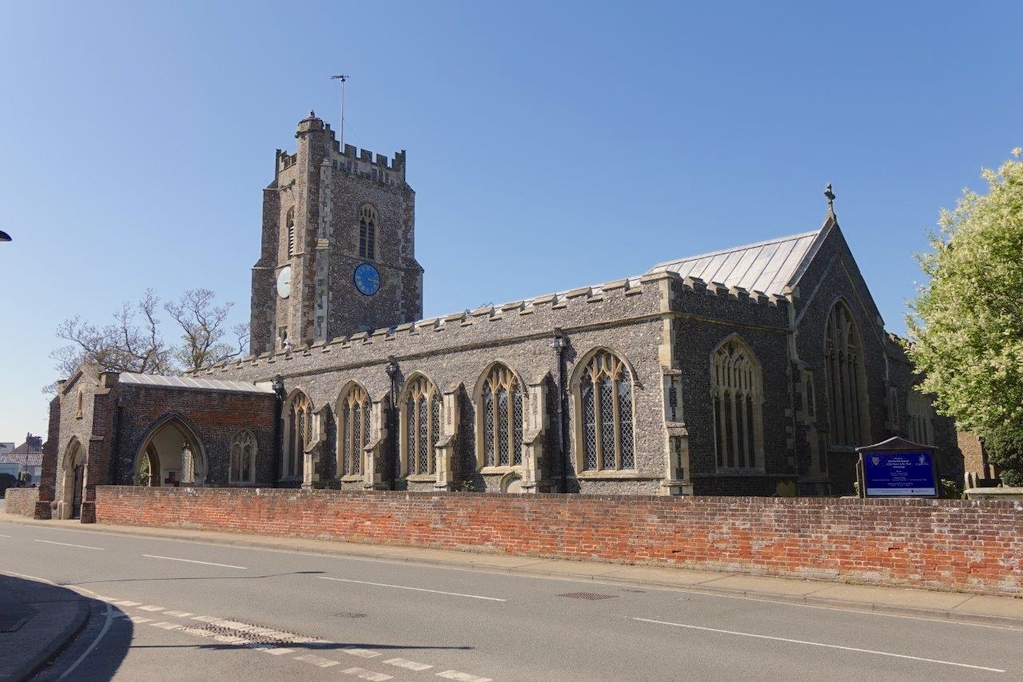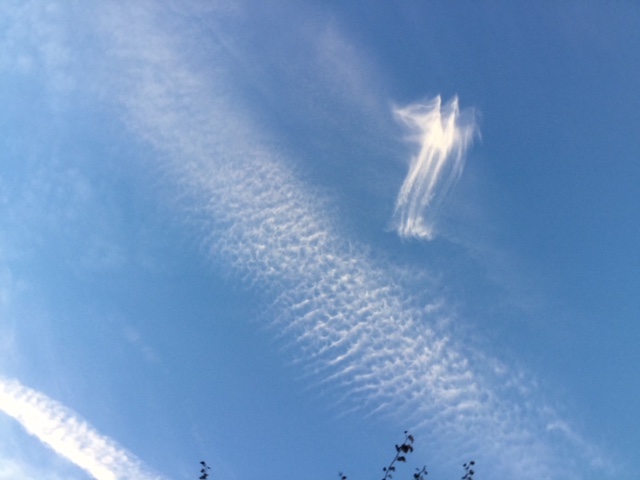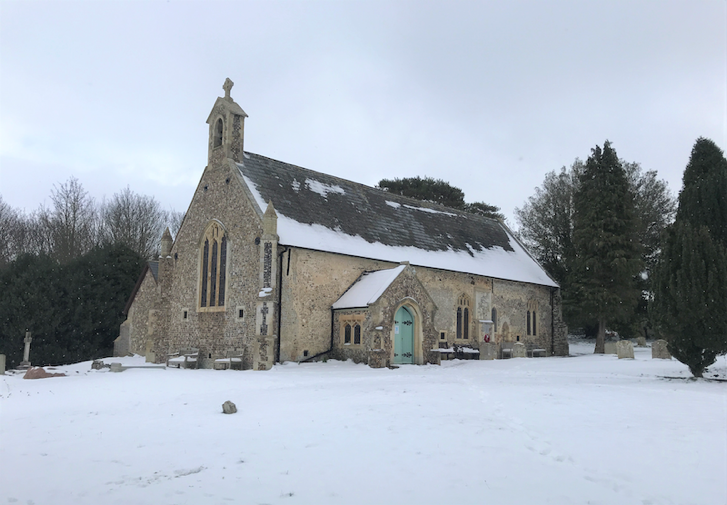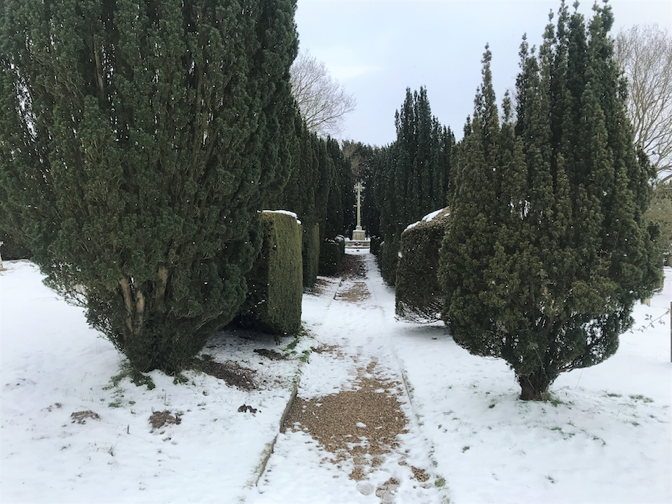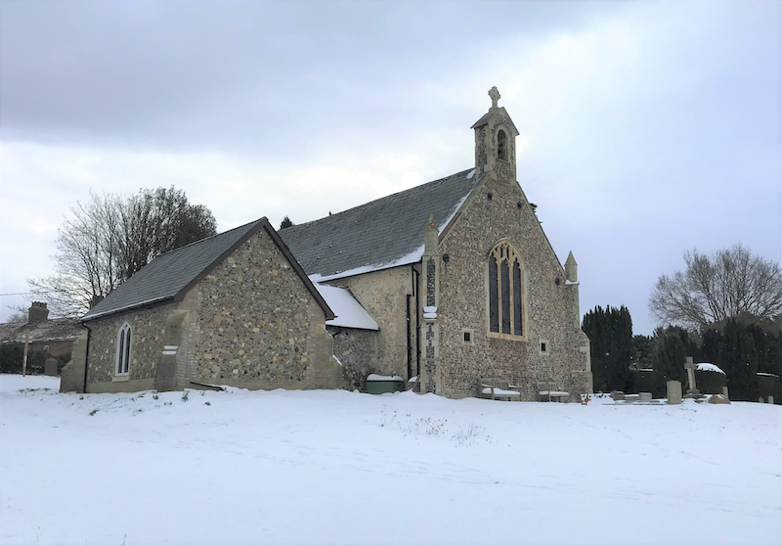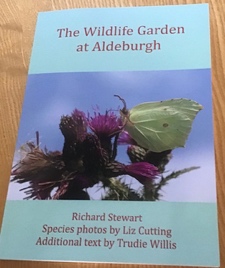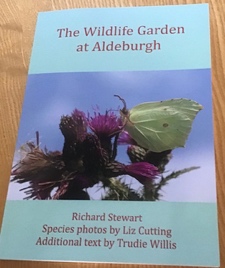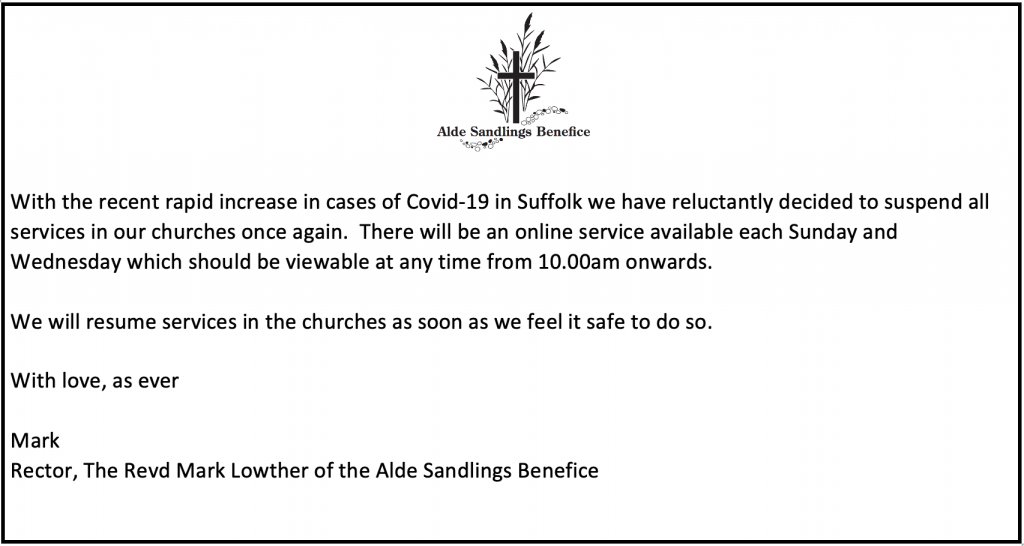Message from The Rector
Some really good news to begin with. The details still need to be finalised, but I think it is safe to announce that there will be services in our churches at Easter. We will still need to be very careful; we will use the possibility offered to us by our churchyards to hold some of them outdoors (where things are a little safer) but, all being well, I should be able to reveal some more details next week. Alleluia!
Speaking of churchyards, a word or two about Aldeburgh. We have a plan to thin out the trees in the churchyard, remove the dead and diseased ones and carry out necessary, and long overdue, maintenance on others. All of the work has to be approved by both the council and the diocese – nothing will be done improperly. But we have hit a problem. Back in the late 1980’s and early 1990’s a number of trees were planted that had been donated by Aldeburgh families in memory of loved ones departed. We think there was a plan, or a list, of all of these trees but it has been missing for some years. Searches were made during the vacancy before my arrival, and nothing was found, and we have tried again recently with no success. So, if anyone has any information about where that list, or a copy of it, might be we would love to know. Ideally, before we do any work on any of these trees, we would like to be able to contact families who donated them 30 years ago. All information gratefully received!
The general tidy-up of Aldeburgh churchyard continues – and you may be able to help. Recent windy weather has brought down lots of twigs and small branches and we need to collect them together. If you fancy spending a few minutes in the churchyard doing a ‘natural litter pick’ and collecting some of the debris, there are now some signposted places to leave stuff (courtesy of Nigel Howcutt and Mike Shepherd – thanks gents) and from where it can easily be collected together to be dealt with. All help most gratefully received.
For any who missed our local World Day of Prayer service on Friday (compiled by the women of Vanuatu) you can still find it online. The easiest place to go is here:
https://www.youtube.com/watch?v=myy_RbdOZIg
.. and listen out for some familiar voices!
Online services and social events continue, and I would particularly draw your attention to the upcoming ones organised by our ‘Pilgrims Together’ group, beginning with a quiz on the evening of Saturday 6th (if you’re reading this email on the day it arrived, that’s tonight!) The last one was great fun and very well put together and this one promises to be too. Full details elsewhere in this document.
Finally, as part of our gentle reawakening of services in church, weekday Morning Prayer will resume in Aldeburgh church on Monday at 9.00am. Anyone is welcome at any of the services, and they last no more than 30 minutes.
With love, as ever
Mark
Collect
Almighty God, whose most dear Son went not up to joy but first he suffered pain, and entered not into glory before he was crucified:
mercifully grant that we, walking in the way of the cross,
may find it none other than the way of life and peace;
through Jesus Christ your Son our Lord, who is alive and reigns with you, in the unity of the Holy Spirit, one God, now and for ever.
First Reading
Exodus 20.1-17
Then God spoke all these words:
I am the Lord your God, who brought you out of the land of Egypt, out of the house of slavery; you shall have no other gods before me. You shall not make for yourself an idol, whether in the form of anything that is in heaven above, or that is on the earth beneath, or that is in the water under the earth. You shall not bow down to them or worship them; for I the Lord your God am a jealous God, punishing children for the iniquity of parents, to the third and the fourth generation of those who reject me, but showing steadfast love to the thousandth generation of those who love me and keep my commandments. You shall not make wrongful use of the name of the Lord your God, for the Lord will not acquit anyone who misuses his name.
Remember the sabbath day, and keep it holy. For six days you shall labour and do all your work. But the seventh day is a sabbath to the Lord your God; you shall not do any work—you, your son or your daughter, your male or female slave, your livestock, or the alien resident in your towns. For in six days the Lord made heaven and earth, the sea, and all that is in them, but rested the seventh day; therefore the Lord blessed the sabbath day and consecrated it.
Honour your father and your mother, so that your days may be long in the land that the Lord your God is giving you.
You shall not murder
You shall not commit adultery.
You shall not steal.
You shall not bear false witness against your neighbour.
You shall not covet your neighbour’s house; you shall not covet your neighbour’s wife, or male or female slave, or ox, or donkey, or anything that belongs to your neighbour.
Second Reading
John 2.13-22
The Passover of the Jews was near, and Jesus went up to Jerusalem. In the temple he found people selling cattle, sheep, and doves, and the money-changers seated at their tables. Making a whip of cords, he drove all of them out of the temple, both the sheep and the cattle. He also poured out the coins of the money-changers and overturned their tables. He told those who were selling the doves, ‘Take these things out of here! Stop making my Father’s house a market-place!’ His disciples remembered that it was written, ‘Zeal for your house will consume me.’ The Jews then said to him, ‘What sign can you show us for doing this?’ Jesus answered them, ‘Destroy this temple, and in three days I will raise it up.’ The Jews then said, ‘This temple has been under construction for forty-six years, and will you raise it up in three days?’ But he was speaking of the temple of his body. After he was raised from the dead, his disciples remembered that he had said this; and they believed the scripture and the word that Jesus had spoken.
Sermon for 7th March – The Third Sunday of Lent
by The Revd James Marston – John 2.13-22
May I speak in the name of the living God, Father, Son and Holy Spirit, Amen
Over recent weeks I have been wondering about my faith. Indeed, I have been somewhat troubled and, perhaps accentuated in the quiet moments of lockdown, all sorts of questions have bubbled up into my mind.
Am I imbued with the Christian story in the way I need to be? Am I any good at being a priest? What does God want me to do anyway? What if I’ve got it all wrong? How come everyone else seems so sure?
In these times I think we all have been forced to think deeply about our lives and many have asked themselves the questions to which we don’t always have the answers.
And we all have doubts from time to time. Indeed, if we were all sure all the time about the existence of God it wouldn’t be faith at all. Faith requires doubt, it seems to me, in order to keep it energised, to keep it going and to keep it growing.
This is because doubt makes us look back time and again at why we came to faith in the first place. We retell to ourselves those moments, those markers along the way, when we did glimpse something of the light, we remember the times when we felt God alongside us.
Indeed, I suspect doubt is sometimes a healthy thing as it challenges us to reconsider and to revaluate our beliefs.
In fact, this is what Holy Lent is all about – a time to stand still, take stock, to cleanse ourselves of distractions, in order to pray, reflect and re-examine our faith – we do this in order to develop, and sometimes even redefine, our relationship with God.
Unlike Matthew, Luke and Mark, John places the cleansing of the temple by Jesus early on in his account. This might seem at first a contradiction or a problem with John’s reporting of events – yet while the other gospels use this episode to intensify the conflict between Jesus and the religious authorities, John uses this account to highlight something else.
Predominantly John informs the reader of the divinity of Jesus – who after all calls and claims the temple as his “Father’s house “– as well as offering an act of scriptural interpretation – we hear how the disciples remembered and then believed much later, in the light of the resurrection.
Understanding what it was all about later is often the case with faith – often the passage of time shows us something we hadn’t seen as we lived through it. And as one theologian puts it, the passage shows us that “expanding, deepening, maturing belief comes in a process of engaging, experiencing, and remembering.”
This is why we mark Lent, and indeed other parts of the church calendar, to engage, experience and remember.
Indeed, this passage promises us that if we “pay attention and remember then scripture and its Lord will be revealed as true and reliable however mysterious, incompressible Jesus’ words maybe in the present.” Things come together for the disciples, and indeed us, in the end.
In the meantime, all this begs the question what might this mean for us today in our moments of doubt and uncertainty.
The answer to that, I think, in Lent as much as in these troubled times, is one of holding on to trust. Trust in the revelation of Holy Scripture, but also trust in the loving God we worship and in whom we place our faith. Remembering and engaging and experiencing our faith is done through a variety of means; including worship, loving service, listening to others and, of course, prayer. However simple, however quick, however liturgical, or however silent, prayer, however executed, is at the heart of our faith in God and our relationship with Him.
And this week I encourage and challenge you to find a little time for a little more prayer – for me turning to prayer is how I restore, remember and re-energise my own faith and calling – I suspect it will do the same for you.
Let us pray:
O Christ Jesus,
when all is darkness
and we feel our weakness and helplessness,
give us the sense of Your presence,
Your love, and Your strength.
Help us to have perfect trust
in Your protecting love
and strengthening power,
so that nothing may frighten or worry us,
for, living close to You,
we shall see Your hand,
Your purpose, Your will through all things.
Amen.
1 https://www.workingpreacher.org/commentaries/revised-common-lectionary/third-sunday-in-lent-
2/commentary-on-john-213-22-2 (last accessed 04.03.21)
2https://www.workingpreacher.org/commentaries/revised-common-lectionary/third-sunday-in-lent-
2/commentary-on-john-213-22-2(last accessed 04.03.21)
|
This Week’s Review is Chris Packham’s
His new series, Animal Einsteins, really is fascinating viewing for anyone with a love of nature, and animals in all shapes and sizes. How do animals survive in the wild, how do they know what to be wary of, and know what foods are poisonous to them? Researchers, new science, and cutting-edge technology can now give us a glimpse into the animal world and understand them a little better. What are the birds that visit our gardens saying to each other with their beautiful song? Did you know that bees communicate with each other? They make a whoop noise to show recognition of a minor ‘bee collision’. How very dignified! If you want to be totally submerged for an hour, I thoroughly recommend this series. https://www.bbc.co.uk/programmes/m000slks Claire Turner |
News from The Red House February 2021
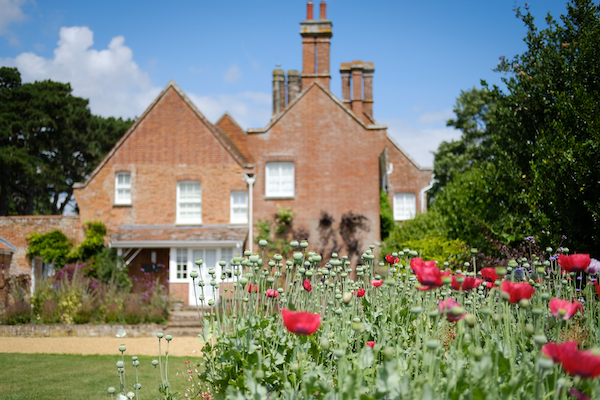
Thank you for giving us the opportunity to update parishioners on what is happening at The Red House in Aldeburgh. Our gates may be closed but we have been busy maintaining the site and preparing for our opening season in the coming months.
Now that we are part of a larger organisation, merging with Snape Maltings in April 2020, Britten Pears Arts brings together Benjamin Britten and Peter Pears’ life and legacy. It has given us renewed energy and resources working with our colleagues and it has been especially important for a number of projects that are in progress.
We feel lucky to have been able to access the site throughout lockdown and garden manager Penny Brice has spent the winter doing the necessary pruning and cutting back of hedges, borders and trees plus planting around 1,500 snowdrop bulbs and hundreds of crocuses and daffodils. She has been supported by a wonderful team of volunteers who live locally and have been able to give up a few hours to weed, plant and cut. All of this work, and more, is in readiness for our first National Garden Scheme events which will be on 3 and 31 May and 5 September. You can find out more on the NGS website here https://ngs.org.uk/view-garden/42451.
The archive building has been closed to the public and readers for nearly a year, but they have adapted to dealing with online enquiries from near and far and continued to catalogue the collection and make more information available online. Other online activities have included ‘Archive Treasure’ articles that focus on one object and its story. Subjects have ranged from Britten and Pears’ connection with Indian music, Britten’s car crash in 1937, the Channel Air Bridge and Decimalisation. All can be read at https://brittenpears.org/news/. They also share fun and interesting stories and ‘on this day’ posts on Twitter https://twitter.com/BrittenOfficial which is well worth a follow. The archive’s state-of-the-art building is also working for the parish, providing safe and secure storage for the rare Bible that belongs to the church in conditions that guard it against deterioration or theft and parishioners are welcome to view it there.
We are making some updates which we hope our visitors will enjoy too. Our entrance, which sits opposite the main house in a one level barn will be reconfigured to house a larger shop, a central welcome desk and more lockers and seating. We will also have a pop-up café in the garden which will offer tea/coffee and some light bites. We hope to incorporate produce grown in the kitchen garden and orchard into the menu in the spirit of what Britten and Pears did when they were living at The Red House.
We hope these updates have whetted your appetite and we look forward to opening the site up for you to visit. More information and booking will follow soon so visit https://snapemaltings.co.uk/whats-on or join our newsletter to https://brittenpears.org/ to be the first to receive our latest news.
Ella Roberts
Head of Red House
Britten Pears Arts
Thank you Ella, for updating us on The Red House news.
The Week Ahead
Next Sunday 14th March
Fourth Sunday of Lent/
Mothering Sunday
NOTICES
|
Food Banks at the East of England Co-op |
|
Update from the Trussel Trust Organisation Food banks in our network have seen an increase in the number of food parcels given out over the last few months due to Coronavirus, so any donations are much appreciated. You can find out which items your local food bank is most in need of by entering your postcode here – https://www.trusselltrust.org/give-food/ By clicking on the food bank’s name, you can also find out where to drop off your donations. You should also check the food banks website or social media pages for any changes to opening hours or operations as a result of the Coronavirus before dropping off donations – If you would prefer to make a financial donation, then please visit the food bank’s website (under ‘Give help’) or you can donate to the Trussell Trust centrally by contacting our Supporter Care team on 01722 580 178 or emailing supportercare@trusselltrust.org |
|
✞ Friston Sunday Services on Zoom ✞ Friston will be holding a live Zoom service for all those who Please contact admin@aldeburghparishchurch.org.uk for more details |
|
How About a Walk with James? As the weather gradually gets better, our assistant curate James is offering to walk and chat for those that might like to. If you feel like getting out and meeting up with James give him a call on 01728 688451 to arrange. |
|
✞ Pilgrims Together on Wednesdays ✞ The Pilgrims worship together every Wednesday. Please contact admin@aldeburghparishchurch.org.uk for more details Saturday 6th March 7pm- Pilgrim’s Fun Quiz The Quiz Night will start at 7pm (we’ll open the Zoom call from 6.45pm). As before, it’s very much a fun, puzzler evening hosted by Sue and Richard. Definitely not to be taken too seriously! As before, we’ll all mark our own answers. There will be 8 rounds all covering different topics. Each round will be presented by a different person. There will be a break halfway through the evening to share a drink of whatever suits and a nibble of whatever takes your fancy. Please contact admin@aldeburghparishchurch.org.uk for more details **Saturday 20th March 7pm – ‘Did you know Ceilidh’** Following the great success of our first ‘Did you know Ceilidh’, another has been planned! Tell a story of local interest, provide an interesting fact or 2 about our community, introduce us to our local area past and present…surprise us with nuggets of information, the possibilities are endless…you might want to share a short presentation… Come along and share, come along and just listen. Enjoy the evening with a glass / mug of something special of your choice. |
|
Tuesday Coffee Morning with Mark & Friends Our regular Zoom coffee morning will be from 10.30am – 11.30am every Tuesday. All are very welcome. Grab your favourite morning beverage and let’s have a good ole chat – just like we used to. Please contact admin@aldeburghparishchurch.org.uk for more details |
|
Weekly Benefice Newsletter If you would like something added to the weekly newsletter that is relevant to the Benefice, please do let Claire know and we will do our best to include it the following week. Whether it be a story to tell, or tips or recipes or a notice to be added to spread the word. |
|
Book/TV/Film Review Club Have you found a great escape during this lockdown in books, a tv series, or a good film? Are you re-visiting the classics, or reading them for the first time? What box sets are you binge watching? Are you watching The Serpent, The Bay, A Perfect Planet, The Crown? |
|
Suffolk Historic Churches Ride & Stride Date for your diaries – 11th September for the 2021 Ride and Stride. |
|
Mothering Sunday Newsletter |
